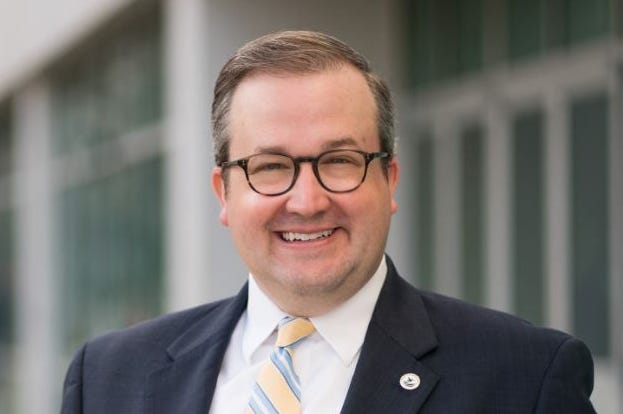Multiple choice
FreeCons play key roles in advancing educational freedom
Last week, Louisiana became the 12th state to adopt universal school choice. The state legislature approved the LA GATOR program, which offers Education Savings Accounts to all parents.
They’ll be able to use the funds for tuition, curriculum, textbooks, testing fees, and other educational goods and services. Gov Jeff Landry will soon sign the bill into law.
That’s not the only news on the educational-freedom front. In primary contests in Texas and Idaho, GOP voters overwhelmingly picked legislative candidates who favored school choice over opponents who didn’t.
Ed Tarnowski, a signatory to the Freedom Conservatism Statement of Principles, tracks the issue for the advocacy group EdChoice. Tarnowski, whom we previously profiled, pointed to other school-choice gains last month in Oklahoma and Missouri.
Freedom Conservatives play critical roles in the movement for parental choice and school competition. Today we feature the work of several FreeCon leaders in the fight for educational freedom.
Moral imperative
Daniel Erspamer is chief executive officer of Louisiana’s Pelican Institute for Public Policy and a FreeCon signatory.
Prior to his role at the Pelican Institute, Erspamer served as Vice President for Strategic Partnerships for State Policy Network, and in a variety of leadership and development roles at the national office of Americans for Prosperity.
The work of Erspamer and his colleagues helped pave the way for the recent expansion of school choice in Louisiana. “Every child should have access to a high-quality education, ensuring every Louisiana resident has a chance to succeed,” the institute stated.
“Louisiana cannot have a bright economic future without a workforce equipped with the skills and training necessary to compete in a 21st century economy. Revamping Louisiana’s educational system stands as an economic imperative — and a moral one too.”
Range of options
Robert Maranto is the 21st Century Chair in Leadership at the Department of Education Reform at the University of Arkansas, as well as a FreeCon signatory.
Maranto previously taught at Villanova and has served on his local school board and on a charter board. He edits the Journal of School Choice and has with colleagues produced 15 scholarly books, including Educating Believers: Religion and School Choice, President Obama and Education Reform, COVID-19 and Schools Policy, Stakeholders, and School Choice, and The Politically Correct University.
In a recent essay for Skeptic, Maranto wrote about the corrosive effects of poorly structured, poorly led education schools on American public policy.
Arguing for changes in both higher education and teacher certification, he observed that “successful professions build, select, and train for knowledge and independent judgment rather than mere compliance to rules and deference to superiors.”
“Coupled with school choice that provides a range of options, as is the case in countries such as Belgium and the Netherlands (which have better schools than the United States),” he concluded, “such systems could incentivize schools of education to reform and so produce the educators parents really want for their children.”
Up their game
Ben DeGrow is senior policy director for education choice at ExcelinEd, which supports state leaders in transforming education to unlock opportunity and lifelong success for each and every child. DeGrow is also a FreeCon signatory.
He’s worked nearly two decades in state-based public policy, providing expert analysis in school choice, school finance and more for Colorado’s Independence Institute and Michigan’s Mackinac Center for Public Policy.
His classroom experiences include service as a university graduate assistant, high school history teacher, and substitute teacher in Michigan public schools.
In an interview with Pennsylvania station WTAJ, DeGrow praised the state senate’s passage of a bill to expand a Pennsylvania school-choice program. “These programs benefit the students that remain in public schools,” he said, by “encouraging more competition and helping local school leaders up their game.”
In the mix
• At National Review Online, Gabriel Scheinmann of the Alexander Hamilton Society outlined a strategy for saving America’s universities from chaos and corruption. Their leaders must “grapple with the fact that the antisemitic views roiling campuses are features rather than bugs of their admissions and academic policies,” he wrote. Unfortunately, “academic appeasement is easier than educational reform.”
• For Fox News, John Locke Foundation CEO Donald Bryson contrasted California’s woes with North Carolina’s robust growth: “By maintaining low taxes and controlling spending, North Carolina has created an environment conducive to business and investment, fostering economic resilience even during challenging times. California, on the other hand, illustrates the pitfalls of high taxes and expansive spending without adequate fiscal controls.”
• In a recent blog post, Dan Mitchell of the Center for Freedom and Prosperity compared European reforms of public pensions to the unwillingness of American politicians to tackle Social Security. Greece recently adopted personal retirement accounts, for example, joining the likes of Sweden, Denmark, and the Netherlands. Other countries, such as Italy, have adopted reforms that at least tie benefits directly to taxes paid. Contrary to conventional wisdom, Mitchell observed, “reform is possible.”
• In the Magnolia Tribune, founder Russ Latino wrote about conservatism, populism, and realignment. “Reanimating the principles of conservatism,” Latino argued, “can also offer a radical alternative to our current political landscape — where both parties, at times, seem more consumed with gathering power to impose their will on the other, than limiting the power that would allow for this imposition in the first place.”



